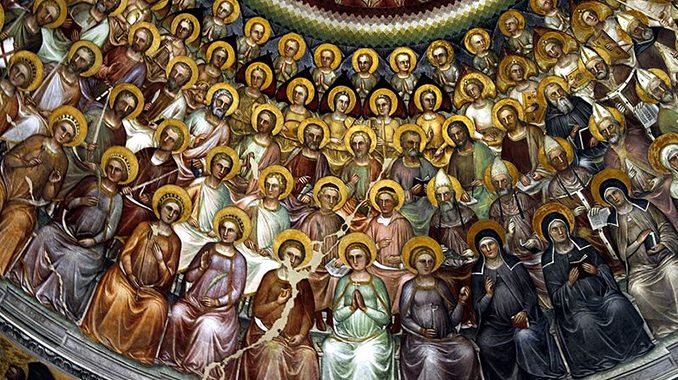
Readings:
• Rev 7:2-4, 9-14
• Psa 24:1BC-2, 3-4AB, 5-6
• 1 Jn 3:1-3
• Mt 5:1-12a
Many readers are understandably confused or puzzled when hearing a passage from the Book of Revelation. It is unfortunate, however, that many end up dismissing what they’ve heard. In so doing, they miss out on some of the most joyful passages of sacred Scripture. Yes, that’s right—joyful.
Today’s first reading is a perfect example of such a passage. It is read on the Solemnity of All Saints because it describes the reason we were created. Using a multitude of references to the Old Testament, John the Revelator shows what it means to be a saint, a “holy one.” I wish to highlight three of the characteristics shared by all saints revealed in the seventh chapter of The Apocalypse. The word apokalypsis, by the way, refers to an “unveiling”—primarily of Jesus Christ, of course, but also of God’s fulfilled work of salvation and his plan for each of us.
The first characteristic of all the saints is they are sealed by God. Prior to judgment being sent from the throne room of heaven upon the wickedness of man, the servants of God are to be sealed, or marked, and thus set apart as holy. This imagery is drawn from the ninth chapter of Ezekiel, which describes the Lord commanding a mysterious “man clothed in linen” to go through Jerusalem and “put a mark upon the foreheads of the men who sigh and groan over all the abominations that are committed in it” (Ez 9:3-4). Those who loved God and who hated sin were saved; all others perished. The mark described by Ezekiel would protect the righteous Israelites from four rapidly approaching judgments, to be carried out by Babylon (another name used often in the Book of Revelation).
Jesus was set apart by the Father with a seal (Jn 6:27). Those who are baptized into Christ are also marked, with the seal of the Holy Spirit, which is both familial and judicial in nature. Those marked by God belong to him; they are now of his household—the Church—and are under his authority and protection from eternal damnation (see Catechism, pars. 1295-6).
The second characteristic of saints, which builds on the first, is that they are servants and sons of God. Logic tells us it is only proper for man be a servant to his Maker. God’s love, however, reveals and imparts an astounding truth: man is called to be a son of God by grace because of the sacrificial death of the Lamb. As sons, the saints are joined in the communion of the Church, the divine house of God (1 Tim 3:15; Heb 3:5-6). An essential part of the service rendered by the saints is prayer, worship, and praise. “We know that God does not listen to sinners,” Jesus told his disciples, “but if any one is a worshiper of God and does his will, God listens to him” (Jn 9:21).
The saints on earth and in heaven worship and praise God because of the third characteristic: they are saved from sin and death. Baptized into Christ, they rise with him to eternal life. This can be seen in the description of the Church triumphant, which is a great multitude of “every nation, race, people, and tongue,” wearing white robes and carrying palm branches.
“By robes he suggest baptism,” wrote Bishop Primasius (c. 560) in his commentary on The Apocalypse, “and by the palms the triumph of the cross. Since they have conquered the world in Christ, it may be that the robes signify the love which is given through the Holy Spirit…”
Having survived “the time of great distress,” saints enter into eternal joy. The final chapter of the Bible describes that joy. “There shall no more be anything accursed, but the throne of God and of the Lamb shall be in it, and his servants shall worship him; they shall see his face, and his name shall be on their foreheads” (Rev 22:3-4). That is what it means to be saint; that is the reason we were created.
(This “Opening the Word” Scripture column originally appeared in a slightly different form in the November 1, 2009, edition of Our Sunday Visitor newspaper.)
If you value the news and views Catholic World Report provides, please consider donating to support our efforts. Your contribution will help us continue to make CWR available to all readers worldwide for free, without a subscription. Thank you for your generosity!
Click here for more information on donating to CWR. Click here to sign up for our newsletter.




Great article.
Agree, as usual I am puzzeled by many aspects of Revelation. Appreciate the unpacking of this aspect of today’s reading.
When I read your title I felt strangely happy at the thought of being ‘packed and sealed’ for delivery. Your distinction between familial and juridical benefit of baptism is really good. Familial was understood although juridical understood as God’s suzerainty and protection is enlightening. At times in this present crisis of faith and looming existential violent disruption of what once was that juridical dimension is reassuring. Lately that realization has become quite apparent that in these times of great stress, contradiction and challenge Christ gives us a special grace, a deep contemplative sense of his tender love. That He stands the indomitable Warrior within and with us.